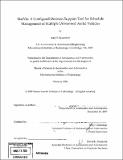StarVis : a configural decision support tool for schedule management of multiple unmanned aerial vehicles
Author(s)
Brzezinski, Amy S
DownloadFull printable version (18.32Mb)
Alternative title
Configural decision support tool for schedule management of multiple unmanned aerial vehicles
Other Contributors
Massachusetts Institute of Technology. Dept. of Aeronautics and Astronautics.
Advisor
Mary Cummings.
Terms of use
Metadata
Show full item recordAbstract
As unmanned aerial vehicles (UAVs) become increasingly autonomous, current single-UAV operations involving multiple personnel could transition to a single operator simultaneously supervising multiple UAVs in high-level control tasks. These time-critical, single-operator systems will require advance prediction and mitigation of schedule problems to ensure mission success. However, actions taken to address current schedule problems may create more severe future problems. Decision support could help multi-UAV operators evaluate different schedule management options in real-time and understand the consequences of their decisions. This thesis describes two schedule management decision support tools (DSTs) for single-operator supervisory control of four UAVs performing a time-critical targeting mission. A configural display common to both DSTs, called StarVis, graphically highlights schedule problems during the mission, and provides projections of potential new problems based upon different mission management actions. This configural display was implemented into a multi-UAV mission simulation as two different StarVis DST designs, Local and Q-Global. In making schedule management decisions, Local StarVis displayed the consequences of potential options for a single decision, while the Q-Global design showed the combined effects of multiple decisions. An experiment tested the two StarVis DSTs against a no DST control in a multi-UAV mission supervision task. Subjects using the Local StarVis performed better with higher situation awareness and no significant increase in workload over the other two DST conditions. The disparity in performance between the two StarVis designs is likely explained by the Q-Global StarVis projective "what if" mode overloading its subjects with information. This research highlights how decision support designs applied at different abstraction levels can produce different performance results.
Description
Thesis (S.M.)--Massachusetts Institute of Technology, Dept. of Aeronautics and Astronautics, 2008. Includes bibliographical references (p. 104-108).
Date issued
2008Department
Massachusetts Institute of Technology. Department of Aeronautics and AstronauticsPublisher
Massachusetts Institute of Technology
Keywords
Aeronautics and Astronautics.